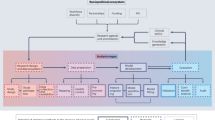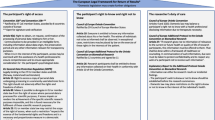Abstract
Recent projects conducted by the International Cancer Genome Consortium (ICGC) have raised the important issue of distinguishing quality assurance (QA) activities from research in the context of genomics. Research was historically defined as a systematic effort to expand a shared body of knowledge, whereas QA was defined as an effort to ascertain whether a specific project met desired standards. However, the two categories increasingly overlap due to advances in bioinformatics and the shift toward open science. As few ethics review policies take these changes into account, it is often difficult to determine the appropriate level of review. Mislabeling can result in unnecessary burdens for the investigators or, conversely, in underestimation of the risks to participants. Therefore, it is important to develop a consistent method of selecting the review process for genomics and bioinformatics projects. This paper begins by discussing two case studies from the ICGC, followed by a literature review on the distinction between QA and research and a comparative analysis of ethics review policies from Canada, the United States, the United Kingdom, and Australia. These results are synthesized into a novel two-step decision tool for researchers and policymakers, which uses traditional criteria to sort clearly defined activities while requiring the use of actual risk levels to decide more complex cases.
Similar content being viewed by others
Log in or create a free account to read this content
Gain free access to this article, as well as selected content from this journal and more on nature.com
or
References
International Cancer Genome Consortium International Cancer Genome Consortium, Hudson TJ, Anderson W, et al: International network of cancer genome projects. Nature 2010; 464: 993–998.
International Cancer Genome Consortium. 2012 (updated 21 January 2015). Available at https://icgc.org/ (accessed on 25 May 2015).
Alioto TS, Buchhalter I, Derdiak S et al: A comprehensive assessment of somatic mutation detection in cancer using whole-genome sequencing. Nat Commun 2015; 6: 10001.
Ewing AD, Houlahan KE, Hu Y, et al: Combining tumor genome simulation with crowdsourcing to benchmark somatic single-nucleotide-variant detection. Nat Methods. 2015; 12: 623–630.
Kass N, Pronovost PJ, Sugarman J, Goeschel CA, Lubomski LH, Faden R : Controversy and quality improvement: lingering questions about ethics, oversight, and patient safety research. Jt Comm J Qual and Patient Saf 2008; 34: 349–353.
Casarett D, Karlawish JHT, Sugarman J : Determining when quality improvement initiatives should be considered research: proposed criteria and potential implications. JAMA 2000; 283: 2275–2280.
Canadian Institute of Health Research, Natural Sciences and Engineering Research Council of Canada Social Sciences and Humanities Research Council of Canada Tri-council Policy Statement: Ethical Conduct for Research Involving Humans. Ottawa, Canada: CIHR, NSERC & SSHRC, 2014.
Interagency Advisory Panel on Research Ethics Definition of quality assurance studies, performance review and research. Ottawa, Canada: Government of Canada, 2003.
International Organization for Standardization/International Electrotechnical Commission ISO/IEC 17025:2005 General requirements for the competence of testing and calibration laboratories. Geneva, Switzerland: ISO/IEC, 2005.
Organization for Economic Co-Operation and Development OECD Best Practice Guidelines For Biological Resource Centers. Paris, France: OECD, 2007.
Organization for Economic Co-Operation and Development OECD guidelines on human biobanks and genetic research databases. Paris, France: OECD, 2009.
International Organization for Standardization ISO 9001:2008 Quality management systems-requirements. Geneva, Switzerland: ISO, 2008.
International Society for Biological and Environmental Repositories: 2012 best practices for repositories: collection, storage, retrieval, and distribution of biological materials for research. Biopreserv Biobank 2012; 10: 79–161.
Joly Y, Dove ES, Knoppers BM, Bobrow M, Chalmers D : Data sharing in the post-genomic world: the experience of the International Cancer Genome Consortium (ICGC) Data Access Compliance Office (DACO). PLoS Comput Biol 2012; 8: e1002549.
National Health & Medical Research Council When Does Quality Assurance in Health Care Require Independent Ethical Review?. Canberra, Australia: Australian Government, 2003.
MacDonald S, Mardis ER, Ota D, Watson MA, Pfeifer JD, Green JM : Comprehensive genomic Studies: emerging regulatory, strategic, and quality assurance challenges for biorepositories. Am J Clin Pathol 2012; 138: 31–41.
Rhodes R, Azzouni J, Baumrin SB, Benkov K, Blaser MJ, Brenner B et al: De minimis risk: a proposal for a new category of research risk. Am J Bioeth. 2011; 11: 1–7.
Cretin S, Keeler EB, Lynn J, Batalden PB, Berwick DM, Bisognano M : Should patients in quality-improvement activities have the same protections as participants in research studies? JAMA 2000; 284: 1786–1788.
Ogrinc G, Nelson WA, Adams SM, O’Hara AE : An instrument to differentiate between clinical research and quality improvement. IRB 2013; 35: 1–8.
Lynn J : When does quality improvement count as research? Human subject protection and theories of knowledge. Qual Saf Health Care. 2004; 13: 67–70.
Pritchard IA : Searching for ‘research involving Human subjects’: what is examined? What is exempt? What is exasperating? IRB 2001; 23: 5–13.
Closs SJ, Cheater FM : Audit or research—what is the difference? J Clin Nurs 1996; 5: 249–256.
Kring DL : Research and quality improvement: different processes, different evidence. Medsurg Nurs 2008; 17: 162–169.
Black N : The relationship between evaluative research and audit. J Public Health Med. 1992; 14: 361–366.
Newhouse RP, Pettit JC, Poe S, Rocco L : The slippery slope: differentiating between quality improvement and research. J Nurs Adm. 2006; 36: 211–219.
Kofke WA, Rie MA : Research ethics and law of healthcare system quality improvement: the conflict of cost containment and quality. Crit Care Med 2003; 31 (3 Suppl): S143–S152.
Grady C : Quality improvement and ethical oversight. Ann Intern Med. 2007; 146: 680–681.
Fain JA : What is the relationship between the continuous quality improvement process and the research process? Diabetes Educ 2005; 31: 461.
Eastes L : Quality assurance vs quality improvement: the new challenge in health care. J Air Med Transp 1991; 10: 5–6.
Fainter J : Quality assurance ≠ quality improvement. J Qual Assur 1991; 13: 8–9, 36.
Amdur RJ, Speers M, Bankert EA : Identifying intent: Is this project research? In: Bankert EA, Amdur RJ (eds): Institutional Review Board: Management and Function. 2nd edn London, UK: Jones and Bartlett, 2006; 101–105.
Hill SL, Small N : Differentiating between research, audit and quality improvement: governance implications. Clin Gov 2006; 11: 98–107.
Martin PA : Is it research? Appl Nurs Res 1995; 8: 199–201.
Vogelsang J : Quantitative research versus quality assurance, quality improvement, total quality management, and continuous quality improvement. J Perianesth Nurs 1999; 14: 78–81.
Lynn J, Baily MA, Bottrell M, et al: The ethics of using quality improvement methods in health care. Ann Intern Med. 2007; 146: 666–673.
Federal policy for the protection of human subjects, 45 CFR. Part 46 1991.
Reinhardt AC, Ray LN : Differentiating quality improvement from research. Appl Nurs Res 2003; 16: 2–8.
Nerenz DR, Stoltz PK, Jordan J : Quality improvement and the need for IRB review. Qual Manag Health Care 2003; 12: 159–170.
Rix G, Cutting K : Clinical audit, the case for ethical scrutiny? Int J Health Care Qual Assur 1996; 9: 18–20.
Koschnitzke L, McCraken SC, Pranulis MF : Ethical considerations for quality assurance versus scientific research. West J Nurs Res 1992; 14: 392–396.
Dokholyan RS, Muhlbaier LH, Falletta JM, et al: Regulatory and ethical considerations for linking clinical and administrative databases. Am Heart J. 2009; 157: 971–982.
Amoroso PJ, Middaugh JP : Research vs public health practice: when does a study require IRB review? Prev Med 2003; 36: 250–253.
Beyea SC, Nicoll LH : Is it research or quality improvement? AORN J 1998; 68: 117–119.
Paxton R, Whitty P, Zaatar A, Fairbarn A, Lothian J : Research, audit and quality improvement. Int J Health Care Qual Assur Inc Leadersh Health Serv 2006; 19: 105–111.
Johnson N, Vermeulen L, Smith KM : A survey of academic medical centers to distinguish between quality improvement and research activities. Qual Manag Health Care 2006; 15: 215–220.
Bellin E, Dubler NN : The quality improvement-research divide and the need for external oversight. Am J Pulic Health 2001; 91: 1512–1517.
Bull AR : Audit and research: complementary but distinct. Ann R Coll Surg Engl. 1993; 75: 308–311.
Saunders MJ : Director of quality improvement research. J Nurs Care Qual. 1993; 7: 39–43.
Snider Jr DE, Stroup DF : Defining research when it comes to public health. Public Health Rep. 1997; 112: 29–32.
Perneger TV : Why we need ethical oversight of quality improvement projects. Int J Qual Health Care. 2004; 16: 343–344.
Council for International Organizations of Medical Sciences International Guidelines For Ethical Review of Epidemiological Studies. Geneva, Switzerland: CIOMS, 1991.
Brett A, Grodin M : Ethical aspects of human experimentation in health services research. JAMA 1991; 265: 1854–1857.
Truog RD, Robinson W, Randolph A, Morris A : Is informed consent always necessary for randomized, controlled trials? N Engl J Med 1999; 340: 804–807.
Thurston NE, Watson LA, Reimer MA : Research or quality improvement? Making the decision. J Nurs Adm. 1993; 23: 46–49.
Lo B, Groman M : Oversight of quality improvement: focusing on benefits and risks. Arch Intern Med. 2003; 163: 1481–1486.
Parker M, Ashcroft R, Wilkie AOM, Kent A : Ethical review of research into rare genetic disorders. BMJ 2004; 329: 288–289.
Wilson A, Grimshaw G, Baker R, Thompson J : Differentiating between audit and research: postal survey of health authorities’ views. BMJ 1999; 319: 1235.
Diamond LH, Kliger AS, Goldman RD, Palevsky PM : Commentary: quality improvement projects: how do we protect patients’ rights? Am J Med Qual 2004; 19: 25–27.
Smith R : Audit and research. BMJ 1992; 305: 905–906.
Health Canada Research Ethics Board Ethics Review of Research Involving Humans. Ottawa, Canada: Health Canada, 2009.
Alberta Research Ethics Community Consensus Initiative Protecting People While Increasing Knowledge: Recommendations for a Province-wide Approach to Ethics Review of Knowledge-generating Projects (Research, Program Evaluation, and Quality Improvement) in Healthcare. Edmonton: ARECCI, 2005.
National Commission for the Protection of Human Subjects of Biomedical and Behavioral Research The Belmont Report: Ethical Principles and Guidelines for the Protection of Human Subjects of Research. Bethesda, MD, USA: National Institutes of Health, 1979.
Department of Health and Human Services: Categories of research that may be reviewed by the Institutional Review Board (IRB) through an expedited review procedure. Fed Regist 1998; 63: 60364–60367.
Quality Improvement FAQs. US Department of Health & Human Services; 2011. Available at http://www.hhs.gov/ohrp/policy/faq/quality-improvement-activities/index.html (accessed on 3 December 2014).
Department of Health Governance arrangements for research ethics committees: a harmonized edition. London, UK: UK Health Departments, 2011.
Health Research Authority Defining Research: NRES Guidance to Help You Decide If Your Project Requires Review by a Research Ethics Committee. London, UK: National Health Service, 2009.
Is my study research? Medical Research Council & National Health Service; 2014. Available at http://www.hra-decisiontools.org.uk/research/ (accessed on 3 December 2014).
National Health & Medical Research Council National Statement on Ethical Conduct in Human Research. Canberra, Australia: Australian Government, 2007.
National Health & Medical Research Council Using The National Statement: Ethical Review of Quality Improvement Activities in Health Services. Canberra, Australia: Australian Government, 2012.
Goldman B, Dixon LB, Adler DA, et al: Rational protection of subjects in research and quality improvement activities. Psychiatr Serv. 2010; 61: 180–183.
Acknowledgements
We thank David Parry, Pilar Nicolas and Francis Ouellette for their valuable contributions to this article. We also thank the Ontario Institute for Cancer Research for their funding of the ICGC project, as well as the Fonds de Recherche du Québec—Santé (Grant # 24463), the Réseau de Médecine Génétique Appliqué, and the Canadian Institutes of Health Research (Grant # TGF-96109) for their financial support.
Author information
Authors and Affiliations
Corresponding author
Ethics declarations
Competing interests
The authors declare no conflict of interest.
Rights and permissions
About this article
Cite this article
Joly, Y., So, D., Osien, G. et al. A decision tool to guide the ethics review of a challenging breed of emerging genomic projects. Eur J Hum Genet 24, 1099–1103 (2016). https://doi.org/10.1038/ejhg.2015.279
Received:
Revised:
Accepted:
Published:
Issue date:
DOI: https://doi.org/10.1038/ejhg.2015.279



